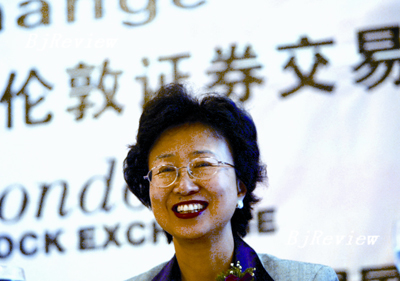
The enormous Chinese market has attracted the attention of increasing numbers of the world's China experts. Stationed in China and fully competent in international management, these experts are advantaged by their unique
affinity to China. With yellow skin and dark eyes, they speak Chinese and understand the etiquette and customs of China, and are proven to be most suitable candidates to fill multinationals' offices in China. Zhu Xiaojian, one of these experts, is clearly a good choice for the position of Asia-Pacific Region President of the London Stock Exchange (LSE).
Zhu joined the LSE in 1998 and has witnessed the growth of Chinese enterprise listings, from one company to several dozen companies. Since March 1997- "a memorable day"-when Beijing Datang Power Generation Co. Ltd. became the first Chinese company to be listed on the LSE, there have been 59 Chinese mainland companies listed on the LSE, including six on the main board and 53 (all private enterprises) on the AIM (Alternative Investment Market). In addition, 14 Hong Kong companies are also listed on the LSE.
"Flexibility in accounting standards is our advantage," said Zhu. "The LSE accepts not only British and American accounting standards, but also the international accounting standard. It is very convenient for a Chinese enterprise to apply for listing on both the London and Hong Kong exchanges using the same set of documents because the listing rules of London and Hong Kong are identical and the legal structures are also similar." Air China (0753.HK), for instance, used the same set of documents to successfully list on the Hong Kong and London exchanges in December 2004.
Strong support from institutional investors is also an important advantage for the LSE in attracting overseas enterprises. "European investors are more conservative and choose companies based on the long-term investment objective," said Lan M. Oades, General Manager of StraMark Capital Group's China Office. "On the AIM market, 80 percent of the investors are institutional investors."
More importantly, Zhu pointed out, "The best thing about institutional investors is that they are very stable, which is beneficial to Chinese enterprises seeking long-term development." Moreover, since institutional investors are the main players on the London market, monitoring is relatively relaxed and requires much lower monitoring fees.
As the third largest stock exchange in the world, the LSE has become the top choice for IPOs of non-U.S. companies. In 2000, the LSE restructured itself, and in July 2001 it was listed on its own exchange. Today, its stock price has more than tripled, from the initial 3.48 pounds to 12.8 pounds (about $25.64).
A relaxed AIM draws
Today, the annual trading volume and the number of new listings on the LSE have surpassed U.S. stock exchanges. Its AIM, because of the relatively relaxed listing requirements, has attracted a large number of small and medium-sized enterprises (SMEs), particularly Chinese enterprises.
The AIM was established in 1995 at the request of the British Government to provide SMEs and high-growth enterprises with a fundraising channel. The average time required to list on the AIM is three to six months and the average listing fee is $800,000 to $1 million. The AIM has 39 industrial boards and 104 sub-boards covering hi-tech, IT, bio-tech, mining, retail, manufacturing, environmental protection and renewable energy, etc. Mergers and acquisitions, and switching to the main board of the LSE are common practices for the AIM-listed companies.
"The AIM has become an international market," said Zhu. "More than 2,600 enterprises have listed on the AIM. Currently, the market has more than 1,700 listed companies, including over 350 overseas companies, after deducting the transferred or cancelled enterprises."
|
